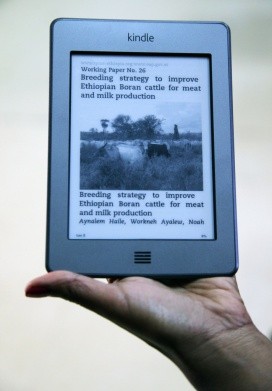In Ethiopia, access to internet is limited in most areas outside of Addis Ababa, Ethiopia’s capital city. So when you see a number of agricultural extension workers in the sprawling mountains and fields of rural Ethiopia holding e-readers, they may seem slightly out of place.
 Kindle e-readers for development agents and extension experts. Photo: Zerihun Sewunet/ILRI
Kindle e-readers for development agents and extension experts. Photo: Zerihun Sewunet/ILRIAgricultural extension workers in Ethiopia go deep into remote areas where there is limited to no access to water, electricity or telephone network. They spend days and weeks in the farmers’ field advising on technology adoption for better productivity and production. The rainy season June – August is the busiest season when they need technical information on planting crops.
At this time, it can be challenging to connect extension workers with the cropping information that they need at the exact moment that they need it. Finding the appropriate information is difficult in it of itself. Then accessing that information can require multiple hours on buses to reach an area with the required information or an internet connection, where it may take hours to download the information required.
The Livestock and Irrigation Value Chains for Ethiopian Smallholders (LIVES) project, in an effort to both build the capacity of extension workers and connect them with relevant, easily accessible information has called upon piloting of ICTs, in this case e-readers, whereby easier access to information and knowledge can be accessed
Not all ICTs are efficient because context matters. In Ethiopia, there is a limited knowledge and experience on which ICT fits best for what type of agricultural information in a particular context.
The Ethiopian context shows the potential for the use of e-readers, as the device is simple and easy to handle and can carry many of the documents an extension worker may need. The extended battery life of e-readers is a major bonus, enabling extension workers to carry them around for long hours without the concern of having a low battery.
The Improving Productivity and Market Success (IPMS) project initiated the introduction of Electronic book readers (E- book readers) to alleviate the challenge of accessing information at the right time in addition to building the capacity of extension agents. IPMS purchased 120 kindle e-books. Relevant documents on livestock, irrigation, natural resources, gender et al. were uploaded to each of the e-readers. The documents include scientific research outputs, guidelines, best practice stories and resources in some local languages.
The goal is to empower agricultural extension workers in their ability to advise on services in agricultural activities. For instance, if a farmer is involved in the diary industry then the extension worker could get the required information on feed or artificial insemination or butter processing or marketing at the right outlets.
Now, the question is will the extension staff use the e-readers as anticipated?
Indeed they exhibited greater enthusiasm and optimism while they received the device. But will this last and be used to access knowledge and information in their field of expertise is a question that we ponder here at LIVES.
So, we plan to follow up with extension workers at different intervals to see if the e-readers are actually useful. We conducted one assessment before handing the e-readers out; in this baseline study we found that extension workers are mostly accessing information at training workshops and through some printed documents. However, the use of computers or internet to access information was rare. We plan to follow up again every 6 months for another year.
The fact that the usability of these devices relies highly on the personal interest of the user, his/her culture of reading, demand for knowledge and the availability of the resources in local languages and basic English, instead of scientific language, will be very influential. Luckily, extension staff in Ethiopia are mostly young and technologically savvy. The use of smartphones and the internet is becoming a necessity. So, it’s possible e-book readers as handbooks for extension staff could be taken up to scale. Let’s see how our next round of review goes.
Have you tried using e-book readers to improve access to knowledge in areas where information is relatively difficult to access? Let us know!






/index.jpg?itok=EzuBHOXY&c=feafd7f5ab7d60c363652d23929d0aee)









Comments
The organization I represent, Worldreader, has used e-readers and mobile phones to provide reading material to 348,596 people in many countries including Ethiopia, although our audience is somewhat different from yours. We'd be eager to learn more about the successes and challenges of this initiative. Congratulations of the launch of your project, and all the best!
Thanks Zev. Good to know that e-readers were introduced in Ethiopia as well , to children, i understand. We are looking forward to the result of the study as well. For sure we'll share.